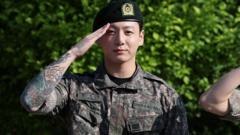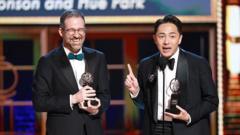The upcoming South Korean election marks a critical juncture for the nation in the wake of a failed military coup and rising political violence. Opposition candidate Lee Jae-myung campaigns under unusual security measures, while the ruling party grapples with its ties to the controversial former president. Voters are seeking a leader who can restore faith in democracy and unite a divided society.
South Korea's Crucial Election: Can It Mend the Fractures of Martial Law?

South Korea's Crucial Election: Can It Mend the Fractures of Martial Law?
As South Korea faces a pivotal election following a tumultuous martial law crisis, the nation hopes for healing through decisive leadership.
South Korea's political landscape is under intense scrutiny as the nation approaches a crucial election, the first since the fallout from last December's martial law crisis. The leading opposition candidate, Lee Jae-myung, is making headlines for campaigning in a bullet-proof vest amid genuine threats to his life. The alarming state of affairs reflects a nation still reeling from a failed military coup orchestrated by former President Yoon Suk Yeol, whose ousting led to a controversial snap election.
Once seen as a grappling post-coup society, South Korea is now characterized by heightened political polarization and violent confrontations. The echoes of protests calling for political leaders' execution illustrate a dramatic shift from normalcy. Lee, who previously livestreamed his resistance to Yoon's military order, is framed as the candidate who promises to safeguard democracy and prevent future martial law declarations.
The ruling People Power Party (PPP) is caught in the storm of their former leader's actions; their candidate Kim Moon-soo, who sided with Yoon during the coup attempt, stands at a disadvantage. Kim's reluctance to distance himself from Yoon's controversial legacy has turned the election into a referendum on martial law, favoring Lee, who has rebranded himself as a protector of democracy.
With polling suggesting Lee holds a ten-point lead over Kim, the former's inconsistent message and controversial past raise questions about his reliability. Meanwhile, Kim's attempts to position himself as a fair candidate may appeal to voters seeking alternatives but lack enthusiasm for his message.
As the election date approaches, both candidates are making strategic shifts to attract broader support. Lee's pivot towards centrist policies contrasts with his previous leftist stance and reflects an effort to garner trust from an increasingly weary electorate. Meanwhile, Kim's campaign is fraught with internal party strife, leaving the PPP’s future uncertain.
Against the backdrop of a society grappling with democracy's fragility, the forthcoming vote represents a chance for South Koreans to reclaim their political power. Voters are eager for a leader who not only acknowledges past mistakes but also commits to transparency and concerted efforts to restore faith in governance. The outcomes of this election could shape not just political sentiment but also the nation's entire trajectory in the years ahead.




















